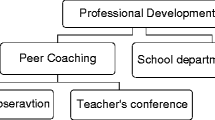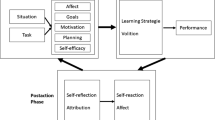Abstract
One important goal of education is to prepare the students with relevant academic competencies and to support their more general well-being and motivation to learn. In this chapter, we will review studies focusing on mathematical skills learning, and the role various cognitive and motivational factors play, especially in the context of Chinese and Finnish education. We will also provide an overview of research, exploring new ways to facilitate learning in the schools by enriching instruction through art-based means, with a particular focus on music. Finally, we will discuss future directions in this line of comparative and multidisciplinary research.
Access this chapter
Tax calculation will be finalised at checkout
Purchases are for personal use only
Similar content being viewed by others
References
Ainley, M. D., Hidi, S., & Berndorff, D. (2002). Interest, learning and the psychological processes that mediate their relationship. Journal of Educational Psychology, 94(3), 545–561. https://doi.org/10.1037/0022-0663.94.3.545.
Aunio, P., Ee, J., Lim, S. E. A., Hautamäki, J., & Van Luit, J. E. H. (2004). Young children’s number sense in Finland, Hong Kong and Singapore. International Journal of Early Years Education, 12(3), 196–216. https://doi.org/10.1080/0966976042000268681.
Aunio, P., Heiskari, P., Van Luit, J. E. H., & Vuorio, J.-M. (2015). The development of early numeracy skills in kindergarten in low-, average- and high performance groups. Journal of Early Childhood Research, 13(1), 3–16.
Aunio, P., & Niemivirta, M. (2010). Predicting children’s mathematical performance in grade one by early numeracy. Learning and Individual Differences, 20(5), 427–435. https://doi.org/10.1016/j.lindif.2010.06.003.
Aunio, P., & Räsänen, P. (2015). Core numerical skills for learning mathematics in children aged five to eight years—a working model for educators. European Early Childhood Education Research Journal. https://doi.org/10.1080/1350293x.2014.996424.
Aunola, K., Viljaranta, J., Lehtinen, E., & Nurmi, J.-E. (2009). Cross-lagged relations between task motivation and performance in arithmetic and literacy in kindergarten. Learning and Instruction, 19, 335–344.
Battin-Pearson, S., Newcomb, M. D., Abbott, R. D., Hill, K. G., Catalano, R. F., & Hawkins, J. D. (2000). Predictors of early high school dropout: A test of five theories. Journal of Educational Psychology, 92(3), 568–582.
Chan, W. W. L. (2014). Understanding and processing numbers among Chinese children. Psychology & Neuroscience, 7(4), 583–591.
Chan, B. M. Y., & Ho, C. S. H. (2010). The cognitive profile of Chinese children with mathematics difficulties. Journal of Experimental Child Psychology, 107, 260–279.
Chan, W. W. L., Au, T. K., & Tang, J. (2011). Exploring the developmental changes in automatic two-digit number processing. Journal of Experimental Child Psychology, 109, 263–274.
Chan, W. W. L., Au, T. K., & Tang, J. (2013). Developmental dyscalculia and low numeracy in Chinese children. Research in Developmental Disabilities, 34, 1613–1622.
Chan, W. W. L., Au, T. K., & Tang, J. (2014). Strategic counting: A novel assessment of place-value understanding. Learning and Instruction, 29, 78
Cordova, J. R., Sinatra, G. M., Jones, S. H., Taasoobshirazi, G., & Lombardi, D. (2014). Confidence in prior knowledge, self-efficacy, interest and prior knowledge: Influences on conceptual change. Contemporary Educational Psychology, 39(2), 164–174. https://doi.org/10.1016/j.cedpsych.2014.03.006.
Dehaene, S. (1997, 2011). The number sense—How the mind creates mathematics. Revised and Updated Ed. Oxford University Press.
Ee, J., Wong, K. Y., & Aunio, P. (2006). Numeracy of Young Children in Singapore, Beijing & Helsinki. Early Childhood Education Journal, 33(5), 325–332. https://doi.org/10.1007/s10643-006-0088-9.
Gordon, R. L., Fehd, H. M., & McCandliss, B. D. (2015). Does music training enhance literacy skills? A meta-analysis. Frontiers in Psychology, 6, 1777. https://doi.org/10.3389/fpsyg.2015.01777.
Habibi, A., Cahn, B. R., Damasio, A., & Damasio, H. (2016). Neural correlates of accelerated auditory processing in children engaged in music training. Developmental Cognitive Neuroscience, 21, 1–14. https://doi.org/10.1016/j.dcn.2016.04.003.
Hannula-Sormunen, M. M., Lehtinen, E., & Räsänen, P. (2015). Preschool children’s spontaneous focusing on numerosity, subitizing, and counting skills as predictors of their mathematical performance seven years later at school. Mathematical Thinking and Learning, 17(2–3), 155–177. https://doi.org/10.1080/10986065.2015.1016814.
Hakkarainen, A., Holopainen, L., & Savolainen, H. (2012). Mathematical and reading difficulties as predictors of school achievement and transition to secondary education. Scandinavian Journal of Educational Research. http://dx.doi.org/10.1080/00313831.2012.696207.
Hakkarainen, A., Holopainen, L., & Savolainen, H. (2015). A five-year follow-up on the role of educational support in preventing dropout from upper secondary education in Finland. Journal of Learning Disabilities, 48(4), 408–421.
Herholz, S. C., & Zatorre, R. J. (2012). Musical training as a framework for brain plasticity: Behavior, function, and structure. Neuron, 76, 486–502. https://doi.org/10.1016/j.neuron.2012.10.011.
Hau, K. T., & Ho, I. T. (2010). Chinese students’ motivation and achievement. In M. H. Bond (Ed.), The Oxford handbook of Chinese psychology (pp. 187–204). New York, NY: Oxford University Press.
Husberg, H., Aunio, P., Vainikainen, M.-P., & Niemivirta, M. (2017). Working memory and motivation as predictors of children’s arithmetical performance. (Forthcoming).
Janus, M., Lee, Y., Moreno, S., & Bialystok, E. (2016). Effects of short-term music and second-language training on executive control. Journal of Experimental Child Psychology, 144, 84–97. https://doi.org/10.1016/j.jecp.2015.11.009.
Korhonen, J., Linnanmäki, K., & Aunio, P. (2014). Learning difficulties, academic well-being and educational dropout: A person-centred approach. Learning and Individual Differences, 31, 1–10.
Korhonen, J., Tapola, A., Linnanmäki, K., & Aunio, P. (2016). Gendered pathways to educational aspirations: The role of academic self-concept, school burnout, achievement and interest in mathematics and reading. Learning and Instruction, 46, 21–33.
Krapp, A. (2007). An educational–psychological conceptualisation of interest. International Journal for Educational and Vocational Guidance, 7(1), 5–21.
Kraus, N., & Strait, D. L. (2015). Emergence of biological markers of musicianship with school-based music instruction. Annals of the New York Academy of Sciences, 1337, 163–169. https://doi.org/10.1111/nyas.12631.
Kyttälä, M. (2008). Visuospatial working memory in adolescents with poor performance in mathematics: Variation depending on reading skills. Educational Psychology, An International Journal of Experimental Educational Psychology, 28(3), 273–289.
Kyttälä, M., Aunio, P., & Hautamäki, J. (2010). Working memory resources in young children with mathematical difficulties. Scandinavian Journal of Psychology, 2010(51), 1–15.
Kyttälä, M., Aunio, P., Lehto, J. E., Van Luit, J. E. H., & Hautamäki, J. (2003). Visuospatial working memory and early numeracy. Educational and Child Psychology, 20(3), 65–76.
Kyttälä, M., Aunio, P., Lepola, J., & Hautamäki, J. (2013). The role of the working memory and language skills in the prediction of word problem solving in 4- to 7-year-old children. Educational Psychology, 34(6), 674–696.
Kyttälä, M., & Björn, P. (2010). Prior mathematics achievement, cognitive appraisal and anxiety as predictors of Finnish students’ later mathematics performance and career orientation. Educational Psychology, An International Journal of Experimental Educational Psychology, 30(4), 431–448.
Kyttälä, M., & Lehto, J. (2008). Some factors underlying mathematical performance: The role of visuospatial working memory. European Journal of Psychology of Education, Xxiii(1), 77–94.
Lee, W., Lee, M.-J., & Bong, M. (2014). Testing interest and self-efficacy as predictors of academic self-regulation and achievement. Contemporary Educational Psychology, 39(2), 86–99.
McMullen, J., Hannula-Sormunen, M. M., & Lehtinen, E. (2014). Spontaneous focusing on quantitative relations in the development of children’s fraction knowledge. Cognition and Instruction, 32(2), 198–218. https://doi.org/10.1080/07370008.2014.887085.
McMullen, J., Hannula-Sormunen, M. M., & Lehtinen, E. (2015a). Preschool spontaneous focusing on numerosity predicts rational number conceptual knowledge 6 years later. ZDM Mathematics Education, 47(5), 813–824. https://doi.org/10.1007/s11858-015-0669-4.
McMullen, J., Laakkonen, E., Hannula-Sormunen, M., & Lehtinen, E. (2015b). Modeling the developmental trajectories of rational number concept(s). Learning and Instruction, 37, 14–20. https://doi.org/10.1016/j.learninstruc.2013.12.004.
Milovanov, R., & Tervaniemi, M. (2011). The interplay between musical and linguistic aptitudes: a review. Frontiers in Psychology, 2, 321. https://doi.org/10.3389/fpsyg.2011.00321.
Mononen, R., & Aunio, P. (2016). Counting skills intervention for low-performing first graders. South-African Journal of Childhood Education, 6(1), a407.
Moreno, S., Bialystok, E., Barac, R., Schellenberg, E. G., Cepeda, N. J., & Chau, T. (2011). Short-term music training enhances verbal intelligence and executive function. Psychological Science, 22, 1425–1433. https://doi.org/10.1177/0956797611416999.
Moreno, S., & Bidelman, G. M. (2014). Examining neural plasticity and cognitive benefit through the unique lens of musical training. Hearing Research, 308, 84–97. https://doi.org/10.1016/j.heares.2013.09.012.
Niemivirta, M. (2002). Motivation and performance in context—The influence of goal orientations and instructional setting on situational appraisals and task performance. Psychologia, 45, 249–269.
Niemivirta, M., Rijavec, M., & Yamauchi, H. (2001). Goal orientations and action-control beliefs: A cross-cultural comparison among Croatian, Finnish, and Japanese students. In A. Efklides, J. Kuhl, & R. Sorrentino (Eds.), Trends and prospects in motivation research (pp. 163–183). Dordrecht: Kluwer.
Niemivirta, M. & Tapola, A. (2017). Developmental trajectories of school beginners’ perceived competence, interest and performance in mathematics. (Forthcoming).
Niemivirta, M., & Tapola, A. (2007). Self-efficacy, interest, and task performance: Within-task changes, mutual relationships, and predictive effects. Zeitschrift für Pädagogische Psychologie, 21(3/4), 241–250.
Nuutila, K., Tuominen, H., Tapola, A., Vainikainen, M-P., & Niemivirta, M. (2018). Consistency, longitudinal stability, and predictions of elementary school students’ task interest, success expectancy, and performance in mathematics. Learning and Instruction, 56, 73–83.
OECD. (2017). PISA 2015 results (Volume III): students’ well-being. Paris: OECD Publishing.
Rao, N., Moely, B., & Sachs, J. (2000). Motivational beliefs, study strategies, and mathematics attainment in high- and low-achieving Chinese secondary school students. Contemporary Educational Psychology, 25, 287–316.
Siegler, R. S., & Mu, Y. (2008). Chinese children excel on novel mathematics problems even before elementary school. Psychological Science, 19, 759–763.
Tapola, A., & Niemivirta, M. (2008). The role of achievement goal orientations in students’ perceptions of and preferences for classroom environment. British Journal of Educational Psychology, 78, 291–312.
Trautwein, U., Dumont, H., & Dicke, A.-D. (2015). Schooling: Impact on cognitive and motivational development. In J. D. Wright (Ed.), International encyclopedia of the social & behavioral sciences (2nd ed., Vol. 21, pp. 119–124). Oxford: Elsevier.
Tuominen-Soini, H., Salmela-Aro, K., & Niemivirta, M. (2012). Achievement goal orientations and academic well-being across the transition to upper secondary education. Learning and Individual Differences, 22, 290–305.
Tuominen-Soini, H., Salmela-Aro, K., & Niemivirta, M. (2011). Stability and change in achievement goal orientations: A person-centred approach. Contemporary Educational Psychology, 36, 82–100.
Tuominen-Soini, H., Salmela-Aro, K., & Niemivirta, M. (2008). Achievement goal orientations and well-being: A person-centred analysis. Learning and Instruction, 18, 251–266.
Tzelgov, J., Ganor-Stern, D., Kallai, A. Y., & Pinhas, M. (2015). Primitives and non-primitives of numerical representations. In R. Cohen Kadosh & A. Dowker (Eds.), The oxford handbook of numerical cognition (pp. 45–66). Oxford University Press.
Viljaranta, J., Tolvanen, A., Aunola, K., & Nurmi, J.-E. (2014). The developmental dynamics between interest, self-concept of ability and academic performance. Scandinavian Journal of Educational Research, 58(6), 734–756.
Zhang, X., Koponen, T., Räsänen, P., Aunola, K., Lerkkanen, M.-K., & Nurmi, J.-E. (2014). Linguistic and spatial skills predict early arithmetic development via counting sequence knowledge. Child Development, 85(3), 1091–1107.
Author information
Authors and Affiliations
Corresponding author
Editor information
Editors and Affiliations
Rights and permissions
Copyright information
© 2019 Springer Nature Singapore Pte Ltd.
About this chapter
Cite this chapter
Aunio, P., Niemivirta, M., Tervaniemi, M. (2019). The Role of Cognition, Motivation and Well-Being in the Mathematics Learning. In: Yu, S., Niemi, H., Mason, J. (eds) Shaping Future Schools with Digital Technology. Perspectives on Rethinking and Reforming Education. Springer, Singapore. https://doi.org/10.1007/978-981-13-9439-3_10
Download citation
DOI: https://doi.org/10.1007/978-981-13-9439-3_10
Published:
Publisher Name: Springer, Singapore
Print ISBN: 978-981-13-9438-6
Online ISBN: 978-981-13-9439-3
eBook Packages: EducationEducation (R0)




